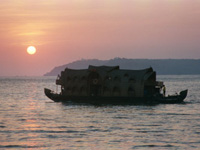 Goa OverviewThis small state, halfway down India's west coast, was a
Portuguese colony until 1961. This goes some way to explaining the
alternative atmosphere here. Cut off from British India by a wall
of mountains and vast alluvial plains, for many years, Goa relied
on trade with a declining Portuguese Empire. However, what was lost
in terms of British trade, was more than made up for in terms of
Portuguese attitude - to this day, Goa retains a distinctly
laid-back and relaxed feel. Goa was discovered by travellers in the late 1960s, who were
relieved to have found somewhere away from the mainstream, and
where holidaying meant simply hanging out, doing some recreational
drugs and partying on the beach (particularly during full moon).
The state quickly grew a reputation for its hedonism and liberal
attitude - not to mention its hot sun, that sets in splendour every
evening over the Arabian Sea. In recent years, though it still
hosts epic trance music festivals (such as Sunburn), the
authorities of Goa have tried to discourage hippies and budget
backpackers from swamping the area, angling rather for clientele
with fatter wallets - with the nett result that Goa is slowly
losing its reputation as India's 'party central'. Now with a quick rail link to Mumbai and charter flights from
the UK, thousands of tourists flock here each winter to relax and
enjoy the famous Goan cuisine - which largely consists of fish and
seafood, prepared in exotic Indian spices. Many hotels and resorts
have popped up over the last few years to cater for this
ever-popular destination, but with more than 25 miles (40km) of
beautiful sandy beaches, there is still plenty of tranquillity to
be found. |